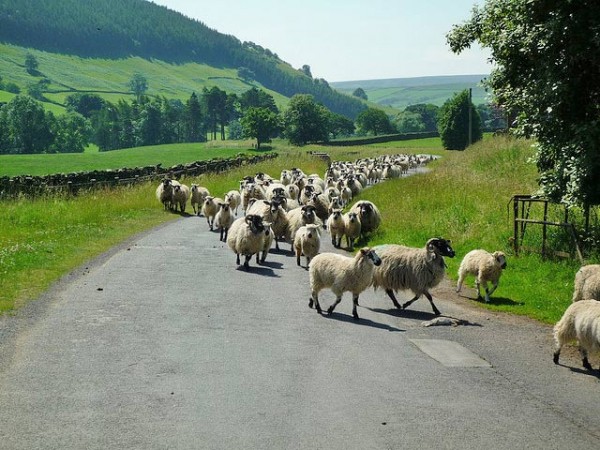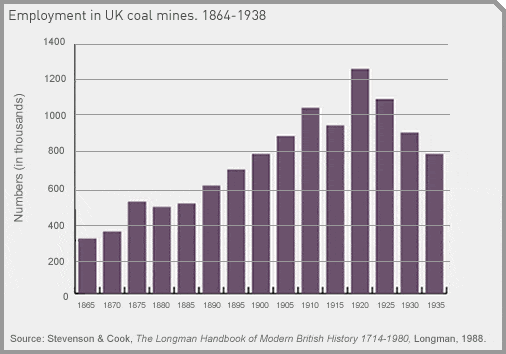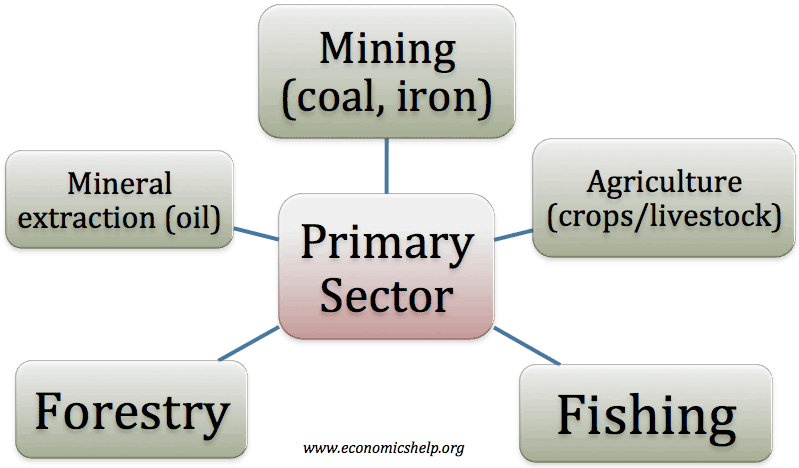What is the primary sector? The primary sector is concerned with the extraction of raw materials. It includes fishing, farming and mining.
In less developed economies, the primary sector will comprise the biggest part of the economy. Typically as an economy develops, increased labour productivity will enable workers to leave the agricultural sector and move to other sectors, such as manufacturing and the service sector.
- In the UK, about 3% of the labour force is engaged in agricultural production.
- In the UK, agriculture, mining and extractive industries account for around 12% of GDP
- Manufacturing is about 10%, and the service sector 78%. (UK GDP stats, weights)
Examples of primary sector
- Farming
- Fishing
- Coal mining
- Forestry and logging,
- Oil extraction,
- Diamond mining.

Issues of the primary sector
- Export revenue. Making use of natural resources can be a way for an economy to gain income and export revenue. The sale of oil, gas and other natural resources have enriched many developing economies enabling them to gain capital to invest in public services within the economy. Some oil-rich countries have successfully used the increase in revenue to save for the future, e.g. Qatar, Saudi Arabia, Norway.
- Monopoly power. One problem with relying on the primary sector is that often wealth becomes inequitably distributed. For example, a small number of firms gain monopoly power over the production of raw materials and pay workers only a small fraction of the revenue gained. Many developing countries in Africa have remained poor, despite being rich in raw materials. A large primary sector is not sufficient on its own to lead to economic development.
- Volatility. Primary products are liable to be volatile in both price and output. Commodities, such as oil and foodstuffs can see large swings in price. Demand is quite price inelastic. If prices fall, then countries which are based on one particular industry can see a large fall in revenue, causing problems. The EU retains significant support for EU agriculture through subsidies and price support.
- ‘Dutch Disease’ If primary products are very profitable, then the resources will be diverted away from other manufacturing industries and concentrated on just primary industries. The problem is that when the raw materials run out or the industry declines, the economy lacks a broad diversification. This can be known as the ‘Dutch disease’ or resource curse.
- Deindustrialisation. In developed economies we have seen a decline in primary sectors, as they take a smaller share of the economy, this can lead to structural unemployment for a period.

Related pages



Wow! I am amazed your answers are the asual answer I wanted.
would education fall into this category. i know its a service so it belongs in tertiary. but isnt knowledge a raw material of sorts. so wouldnt a college fall in to the first three sectors
Education would be service sector. Primary sector is the extraction of raw materials.
What is the main source or roots of education. That would fall into Primary Sector , but education itself wont fall into primary sector.
Yes you are right
No your not XD. Its Tertiary and Quaternary as it is both service and Information
There’s point in your statement.
As a result, it’ll be in-encompassing to classify the educational sector as primary or secondary or tertiary as it’s a three-way sector which involves the specialized art of extracting, refining and giving (service).
Hence, education and it’s allies- research, technological development, training, etc -are collectively classified as Quaternary Sector.
Education is a teriary sector activity because it involves the use of the intellect, wich is a typical characteristic of a service.
Emenogu, leave education where it is classified and go back in time and think.
The primitive man’s primary concern was to feed himself, so hunted and discovered seeds; then to improve the coverings on his body he used the hide to cover his body- the ‘ pomo’ you eat now. To catch fast and dangerous animals he needed metal spears, first used stone to sharpen the wood then he stumbled on metal like iron so he made spear first, then strapnails or knife, then hoe. He could engage in Agriculture. As he was tilling he discovered other Hiden metals underground- You call this mining. With sharp spear he could harpoon fishes in the water. That’s your fishing. In all of these he did not go to any school, college or university. He was starkly uneducated.
No please Education can’t fall into that it will fall into Tertiary production
College falls into both Tertiary and Quaternary as it is out to make a profit and gives information however is still education based. Tertiary: Providing services, Quaternary: Providing information.
What is the contribution of the primary sector to the economy
Food and more food, energy and raw material.
I have a question – If people starts moving to Industrial and Service sectors then who will take up Agriculture ? as we all know agriculture is important to feed the people . please reply
The old farmers who were working in agriculture and who are well experienced in primary sector they will be promoted to secondary sector and the government will take new farmers to do agriculture,this process will be going on.
I Agri to u
The people who make your phones, iPads, iPods, your aeroplanes, computers will go into farming as well. Agriculture is the only sector left for you because you are there and that’s all you can do. If you leave that sector they will take all. Want to do that, or want to reverse position with the manufacturers or share with them?
In my opinion food is the important source of all this sectors….If 90 percent move to service or industrial sector….The remaining 5 percent will be in agriculture and 5 percent people are job less….They will get job opportunities in agriculture and therefore it will increase the job opportunities and development! ! 😊
have a question : isprimary sector enhances the economy of farmer??
The primary sector consist of those activity wherepeopleare engaged in extracting or harvesting
Things from ?
So how it effects the development exactly
i would like to understand how making use of natural resources can be an issue. please
guys help me please. give me two ways in which primary production contributes to the local economy
Can anyone assist me on how the primary sector would apply to a cosmetics company? I have to write a report and define the objectives in different sectors of economy.
Thanks
what are the importance of primary production?
Which was the largest producing sector in 1970-1971?
Thank you friends
big up kingsmead school
how are the primary and secondary industries important to a country’s economic development thrust?